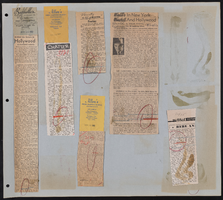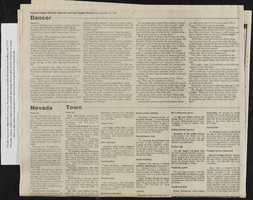Search the Special Collections and Archives Portal
Search Results
Donald G. Anderson oral history interview
Identifier
Abstract
Oral history interview with Donald G. Anderson conducted by Jacqueline Buettner on May 01, 2005 for the Public School Principalship Oral History Project. In this interview, Anderson reflects upon his 30-year career as an elementary school teacher and administrator with the Clark County School District from the 1970s to the 2000s. He discusses his upbringing, and how his own pursuit of education led to his becoming a teacher and administrator. He describes his philosophy of education, and discusses how it evolved with different experiences.
Archival Collection
Charles Jauregui oral history interview
Identifier
Abstract
Oral history interview with Charles Jauregui conducted by Thomas Box on April 24, 2006 for the Public School Principalship Oral History Project. In this interview, Jauregui reflects upon his 30-year career as a teacher and administrator with the Clark County School District (CCSD). He describes challenges that he faced such as student diversity, and describes his regular responsibilities as principal. He discusses his time as principal at Rancho High School in the 1990s, and challenges that he faced with school safety, curriculum development, and the implementation of technology into the classroom.
Archival Collection
Nancie B. Watson oral history interview
Identifier
Abstract
Oral history interview with Nancie B. Watson conducted by Matthew Courtad on November 30, 2004 for the Public School Principalship Oral History Project. In this interview, Watson reflects upon her roughly 30-year career as a teacher and administrator in Nevada and Utah. She discusses her experiences as a teacher, and describes how certain challenges influenced her decision to pursue school administration and influenced her management approach. She discusses the importance of mentorship programs, as well as working relationships between teachers and administrators.
Archival Collection
Bill Garis oral history interview
Identifier
Abstract
Oral history interview with Bill Garis conducted by Laurie Hackett on March 29, 2004 for the Public School Principalship Oral History Project. In this interview, Garis reflects upon his 11 years as a principal with Nevada’s Clark County School District (CCSD). He discusses his approach to school administration and working relationships with teachers and other administrators, and offers suggestions for individuals interested in pursuing school administration. He also discusses his responsibilities as principal of Boulder City High School and Sierra Vista High School.
Archival Collection
Theresa M. Smith oral history interview
Identifier
Abstract
Oral history interview with Dr. Theresa M. Smith conducted by Cheryl Waldman on February 23, 2003 for the Public School Principalship Oral History Project. In this interview, Dr. Smith reflects upon her 24 years as a school administrator in Nevada’s Clark County School District. She discusses her approach to school administration, describes her regular responsibilities and challenges, and compares her responsibilities between middle and high school. She also discusses teacher evaluations, and different challenges associated with evaluations and standardized student testing.
Archival Collection
Arlen Simonson oral history interview
Identifier
Abstract
Oral history interview with Arlen Simonson conducted by Marc Rogers on April 05, 2004 for the Public School Principalship Oral History Project. In this interview, Simonson reflects upon his 10 years of experience as principal at Indian Springs School in Nevada’s Clark County School District (CCSD) from the 1980s to the 1990s. He discusses his working relationship with students and teachers as the school’s only administrator. He also discusses the school’s relationship with the local United States Air Force base and the Thunderbirds.
Archival Collection
Ivory H. Blue II oral history interview
Identifier
Abstract
Oral history interview with Ivory H. Blue II conducted by John Grygo on 2013 February 22 for the African Americans in Las Vegas: A Collaborative Oral History Project. This oral history documents the early life of Ivory H. Blue II in Las Vegas, Nevada while growing up in the Westside projects. He also discusses his college years in the 1990s at the University of Nevada, Las Vegas.
Archival Collection

Transcript of interview with Otto Merida by Claytee White, May 18, 2017
Date
Archival Collection
Description
When looking back on his legacy in the Latinx community of Las Vegas, Otto Merida (1945 - ) takes great pride in being a Latin Chamber of Commerce [LCC] co-founder with Arturo Cambeiro. With the LCC, they forged a powerful economic entity that continues to provide the local Latino community with social and political influence. Growing up during the 1950s in Havana, Otto Merida fondly remembers his childhood despite living under the dictatorship of Fulgencio Batista. There were the murmuring sounds of explosions from afar on the way to baseball games, but also the warm Sunday family meals of Cuban soup with fideos. In this interview, he talks about the rising communist powers inspired by revolutionary Fidel Castro and the events that led his family to place him in the Peter Pan Program in 1961. The Peter Pan Program sent unaccompanied Cuban children to the United States to avoid potential instruction by Castro’s government. Merida still holds on to his mother’s final request upon leaving Cuba-“I want you to remember the address where we live and the phone number: Josefina 68-entre primera y segunda-La Víbora, Havana con el teléfono X4304.” As a part of the Peter Pan Program, Merida experienced a nomadic childhood living in barracks in Miami and a three-story home in Wilmington, DE. The only connection he had to his family were a series of letters he exchanged with his mother, until they reunited years later in Miami. For Merida, life on 79th Street and Biscayne Boulevard in Miami was defined by the values of his family and other Cubans and African Americans in his neighborhood. v Merida earned his bachelor’s degree in Political Science from the University of Florida. He credits his sister-in-law with a pivotal role in his decision to pursue a higher education. His engagement in politics continued through his involvement with the Cuban Circle, the first Hispanic community to be involved with politics in Las Vegas. He describes the migration of Cubans to the casino scene of Las Vegas and the presence of Cubans in the community. His work with the Cuban Circle inspired him to develop a political presence for Hispanics in the community. While travelling across the United States before settling in Las Vegas, Merida made many significant relationships while working with associations such as the Fitchburg Chamber of Commerce and Volunteers in Service to America [VISTA]. Living in Las Vegas, Otto Merida worked as an educator and community organizer. In the late 1970s, Merida and Arturo Cambeiro collaborated to create the Latin Chamber of Commerce of Las Vegas. For Merida, the Chamber consistently goes above and beyond the vision he and Cambeiro had created when they first opened their doors. From the creation of the Latino Youth Leadership Program at UNLV to their work alongside political figures such as Senator Catherine Cortez-Masto, Merida is extremely proud of the various accomplishments of the Chamber. Now as President Emeritus, Otto Merida continues to dedicate himself to the Chamber as a volunteer and serves as one of the many Latinx Voices of Southern Nevada that have shaped the greater Las Vegas community.
Text


